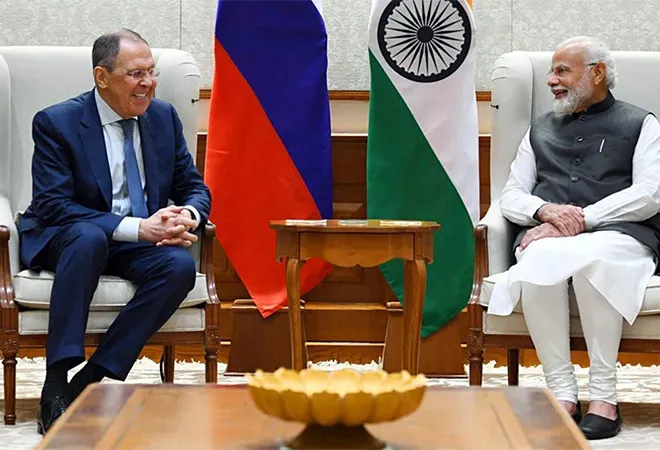
As the Russian military operation in Ukraine enters another month, time and again, non-western countries including India are being dragooned by the West to make Russia suffer the added costs and consequences of the crisis. Recently, with regards to India’s presence at the upcoming G7 Summit, US National Security Coordinator John Kirby
said that although the United States (US) would like a deep partnership with India, Washington wants international pressure on Russia over Ukraine.
The pressure on India in the last few months has been incessant. Previously, Joe Biden had
told Narendra Modi that buying Russian oil would not be in India’s interests, whereas former Deputy National Security Advisor for International Economics in the Biden Administration, Daleep Singh, had warned India of “consequences” if it decided to undermine western sanctions against Russia in any way. Preceding that, India has also had to weather the
threat of American sanctions through CAATSA for arms trading with Russia.
Yet, irrespective of the looming clouds of uncertainty, India seems to have manoeuvred its diplomatic ties with the West quite adeptly, while also not losing sight of the time-tested, strategic partnership that it has had with Russia since independence, which continues to be beneficial.
Irrespective of the looming clouds of uncertainty, India seems to have manoeuvred its diplomatic ties with the West quite adeptly, while also not losing sight of the time-tested, strategic partnership that it has had with Russia.
India’s position regarding the military operation in Ukraine has been clear since the beginning: New Delhi called for the cessation of hostilities without condoning the invasion. But, given its longstanding and sturdy relationship with Russia, India has abstained from voting against Russia at the United Nations Security Council and the General Assembly. India’s calculated balancing act between the West and Russia has yielded India advantages both from the United States and Russia.
Despite the West’s vocal disapproval of India’s position on the Ukraine issue, the US is
reportedly preparing a military aid package worth US$500 million to deepen security ties. This would make India one of the largest recipients of such a package behind Israel and Egypt. India also recently
adopted a framework to enhance existing defence cooperation with Israel, a country closely aligned with the United States.
India has been facing immense flak over the last few months due to its oil trade with Russia. Nevertheless, Russia
rose to become India’s second-biggest oil supplier in May, with only Iraq ahead. In May, Indian refiners received roughly 819,000 barrels per day of Russian oil (the highest in any month) in comparison to about 2,77,000 barrels in April. In 2021, India
only purchased around 2 percent of its total oil imports from Russia (12 million barrels), with its top three suppliers being West Asian countries, followed by the US and Nigeria. But the numbers this year are on a trajectory to substantially surpass the oil supplies to India from Russia last year.
Foregoing trade of an invaluable commodity such as oil from a trustworthy partner like Russia at heavily discounted prices (US$30 per barrel or more) would not be in India’s national interests.
Indian representatives have justified their stance by stating that India imports more than 80 percent of its energy needs from outside. Foregoing trade of an invaluable commodity such as oil from a trustworthy partner like Russia at heavily discounted prices (US$30 per barrel or more) would not be in India’s national interests.
External Affairs Minister, Dr S. Jaishankar also put things into perspective
earlier by pointing out that Europe buys more oil from Russia in an afternoon than India does in a month. Additionally, since Russia launched this military operation in Ukraine in February, the amount of oil that had been pumped into the European Union had reportedly been increasing. Argus Media publishes that the
supply of oil to Europe increased 14 percent between January and April from 750,000 to 857,000 barrels a day. Thus, it would be hypocritical to criticise a developing, energy-dependent country like India for trying to cater to its national interests.
Moreover, in a strong display of their strong resolve to continue with the robust ties, Indian and Russian banks have started discussions over working out a bilateral payment system to ensure that trade flows would not violate global sanctions. The banks on both ends will explore
solutions such as Loro or Nostro accounts. The first is a third-party account, where a bank holds an account in a country for another bank. The second would involve a bank holding an account in another country in another bank.
Russia and India have also refrained from blatantly criticising each other at crucial international fora on extremely vexed issues such as Kashmir, Crimea, and Ukraine.
India has undoubtedly inched quite close to the US in the last two decades because of common strategic interests but India’s relationship with Russia has an immense significance that cannot be overlooked. During India’s initial years of independence, the erstwhile Soviet Union
was willing to trade with India and accept Indian rupees as payment. India’s official position of non-alignment during the Cold War enabled this bilateral relationship to blossom further with defence trade becoming one of the major pillars of the same. Russia and India have also refrained from blatantly criticising each other at crucial international fora on extremely vexed issues such as Kashmir, Crimea, and Ukraine. The Soviet Union was the superpower that also sided with India during the Cold War period when the US had built an extremely close nexus with India’s adversarial neighbour, Pakistan.
At the same time, India cannot afford to antagonise the US given their congruent assessment of the threat of Chinese expansionism, for which the two countries are also a part of the QUAD. India values the US’ political support as the world’s biggest superpower as well and has substantial trade relations with the US on multiple fronts that are inextricably crucial to India’s interests. Therefore, India needs to keep balancing amidst the pressures—an act that it seems to be doing well so far.
The views expressed above belong to the author(s). ORF research and analyses now available on Telegram! Click here to access our curated content — blogs, longforms and interviews.



 As the Russian military operation in Ukraine enters another month, time and again, non-western countries including India are being dragooned by the West to make Russia suffer the added costs and consequences of the crisis. Recently, with regards to India’s presence at the upcoming G7 Summit, US National Security Coordinator John Kirby
As the Russian military operation in Ukraine enters another month, time and again, non-western countries including India are being dragooned by the West to make Russia suffer the added costs and consequences of the crisis. Recently, with regards to India’s presence at the upcoming G7 Summit, US National Security Coordinator John Kirby  PREV
PREV


